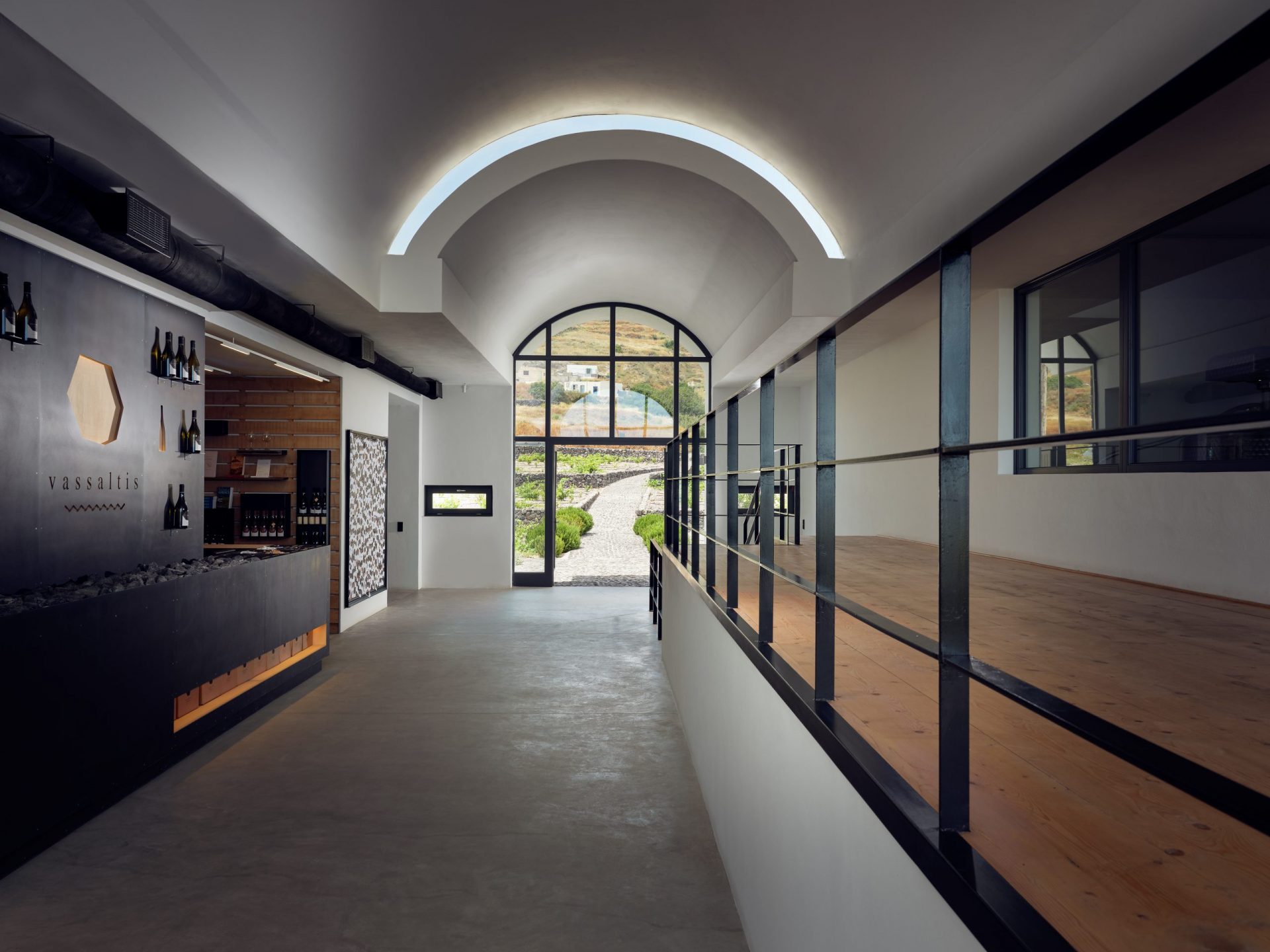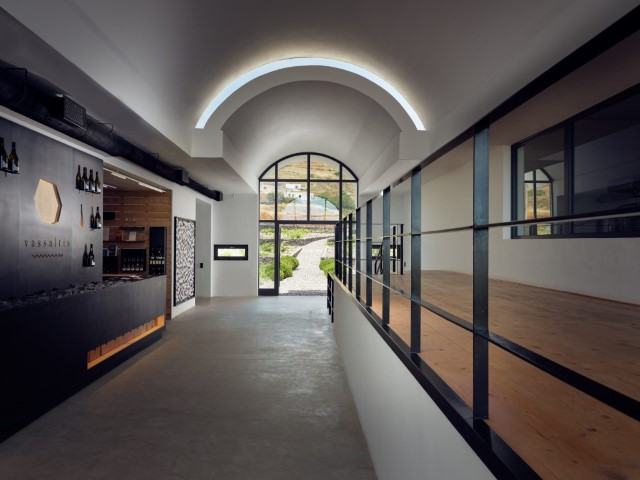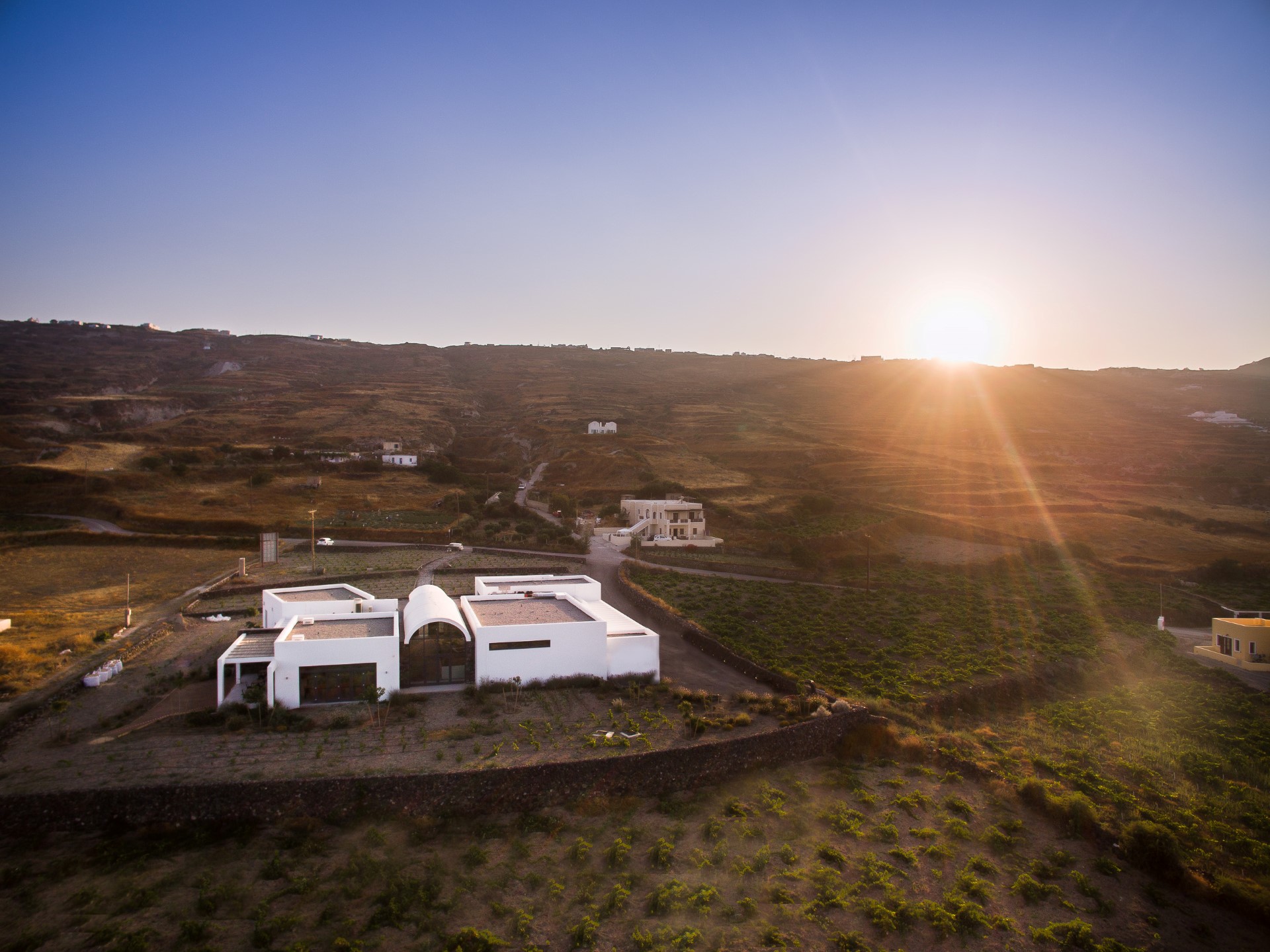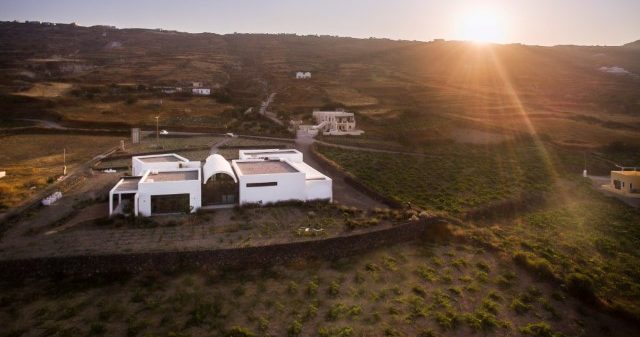Our Story
History
The 2010 Greek financial crisis may strike one as an incongruous time to begin a massive venture. And yet it was exactly this that prompted Yannis Valambous to give up his life as a successful economist in London and return to Greece. His love of wine drew him back to the island of Santorini, where he had spent many a happy family holiday as a child. Here, he embarked on an endeavour, part dream, part folly, to breathe new life into the vineyards he inherited from his father.
Looking out across the vines, Yannis saw the potential to create something truly exceptional and unique with the land his father left him. He desired to do more than simply make wine. He aspired to craft exquisite wines which showcase the quality of Santorini’s grapes while keeping the island’s winemaking tradition alive.
To begin, he put together a winemaking team. First on the ground was Elias Roussakis followed by Yannis Papaeconomou. The three men were brought together by a shared vision: to prove that Santorini is capable of producing world-class wines and that the new generation of Greek winemakers, using their enthusiasm, skill, and winemaking artistry, are the ones to help bring these wines to an international audience of wine lovers. To that end, Yannis transformed a plot among the four hectares he inherited from his father into a thoroughly modern, state-of-the-art boutique winery.
And so, in 2014, Vassaltis was born.
We will never know why Vassilis Valambous purchased vineyards on Santorini. Maybe he wanted an investment, or some land to go with the vacation home he built on the island. Or perhaps, this wine lover with an admiration of local wines, dreamed of one day drinking his own wine or creating a legacy to pass to his children. One hopes that he would be pleased that all these possibilities came true in Vassaltis.
Our Philosophy LOGOS
Our philosophy drives everything we do and touches all corners of the winery. How does one sum up the complexities driving the philosophy behind a dream? For us, it comes down to traditional yet sustainable evolution. While we have great respect for our links to the past, we must move forward. We therefore do not seek to return to our roots. We seek to grow on them
From ancient times we have drunk wine. Three thousand years ago, vines grew exactly where our vineyards are now and people made and enjoyed wine. People learned how to grow vines again after the 17th century BC volcanic eruption covered the island in ash. Our ancestors developed the technique of weaving living vines into the kouloura baskets to protect the fruit from the vicious winds. They created sealing material to allow wine to age and added preservatives to keep it fresh. The next generations took these advancements another step further. They learned how to preserve wine without adding seawater and how to protect it from oxygen. They began to pay more attention to individual grape variety characteristics and moved wine from clay amphora storage containers to glass bottles.
Still today we cultivate and ferment the grape and enjoy the end product. Winemaking has survived because viticulture and winemaking have evolved and adapted. Along with them the taste, packaging, and habits around wine have changed. This constant evolution in both vineyards and wineries has kept wine traditions alive. As young winemakers, we want to take these traditions, build on them, and modernize them in order to pass the baton on to the next generation in a way that is environmentally, socially, and economically sustainable. And through excellence, attention to detail, and creativity, we can achieve success and self-fulfillment.
Our Approach to Wine PATHOS
We have a passion for Santorini and its wines. How else could we be doing what we do? We want to relay this passion to the whole world. Every time someone tries a Santorini wine for the first time, a smile comes to our face.
Our wines are our calling cards. Our most important aim is to be true to the terroir we are blessed to be operating in and express it as pure as it comes. We try to do that by showing a character of balance and finesse. We craft them to be fine terroir wines, ready to drink upon release. That is why we often are happy to hold things in our cellar for 2 or even 3 years before release. In order to craft unique wines we innovate in the vineyard and in the winery, questioning everything people maintain as dogmatic. .
We like to do things differently: Like putting vines on a trellis for optimal quality, harvesting before dawn for the perfect grapes, or even blending white and red grapes in the same wine. Always, with tradition and evolution in mind, trying to unlock the lost mysteries of traditional winemaking. We use technology to harvest at optimal phenolic ripeness to showcase fruity flavors and unlock the full potential of these ever-inspiring varieties. In the winery, we employ a variety of winemaking techniques our oenologists have come across in the four corners of the earth like: battonage, oak maturation, and controlled oxidation to draw out sophisticated qualities. Yes, we try to achieve ageability for our wines; but only through our work in the vineyard and how we handle the grapes at harvest. We will never attempt to force it artificially on the wine.
Our ETHOS
Part of passing the baton means that we owe it to previous generations to continue the wine tradition and keep it alive. And to the next generation, to deliver this tradition as environmentally, socially, and financially sustainable as possible. Our way forward to doing this is by working with integrity and honesty. Integrity is not a choice of “if” or “when” but a mandate of always and we are proud to keep true to our values and work thusly in everything we do.
Firstly, in the wine. We designed our philosophy and approach to wine on the basis of making wine that displays a purity of place and with innate virtue that cannot be faked.
Equally as importantly, in how we treat people. We have created a constructive work atmosphere for everyone involved with Vassaltis and esteem our suppliers, clients, and colleagues by ensuring all our dealings with them are fair and respectful.
Through this ethos, we become better people every day and make better wines every year.

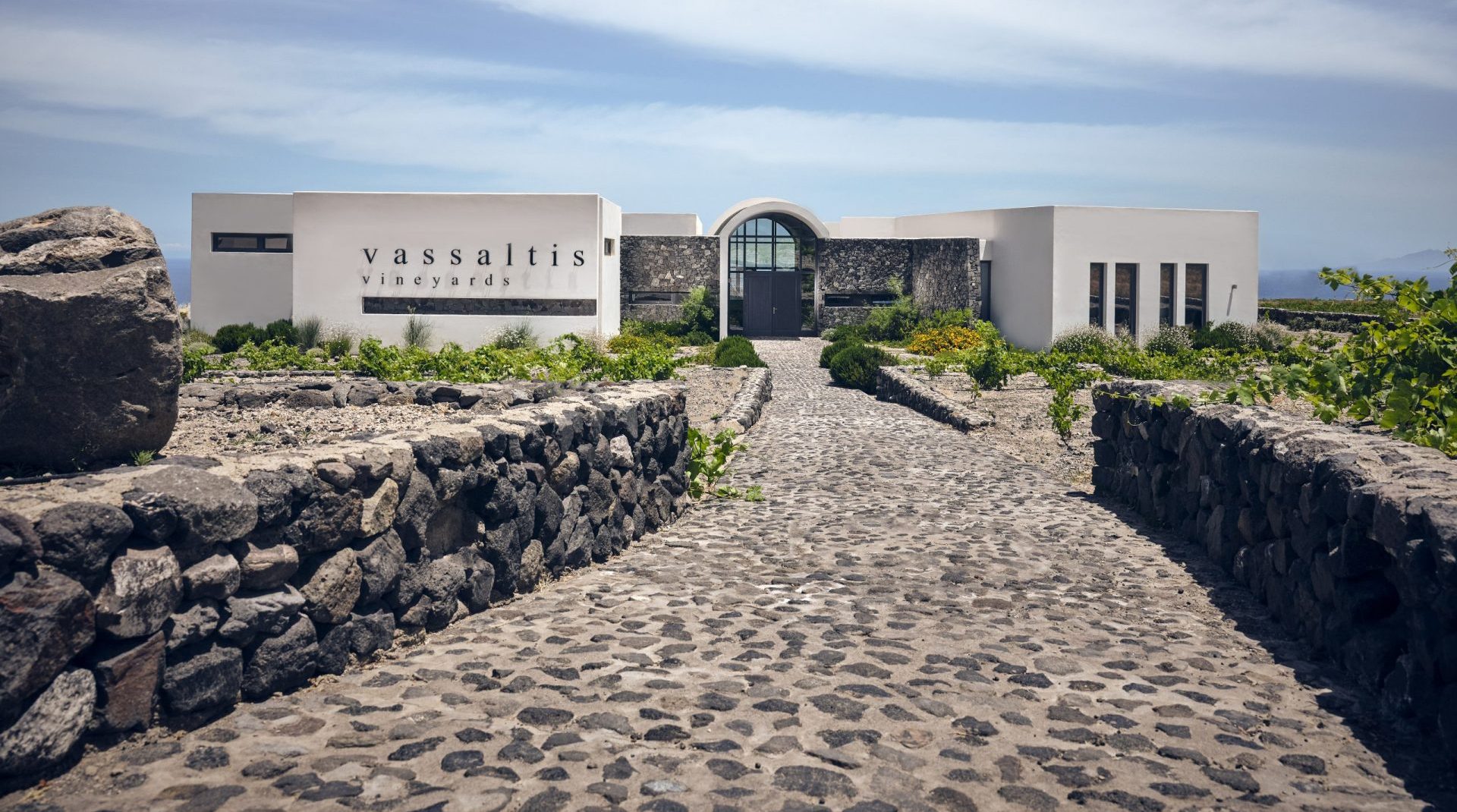
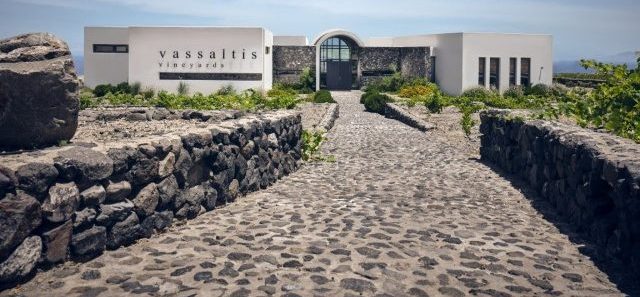


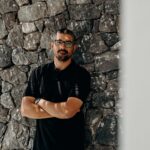 Yannis Papaeconomou is one of our two incredibly talented oenologists. Yannis does not come from a traditional winemaking family. However, his love of wine developed at home where it was enjoyed and respected as an art by his family. He went on to pursue a degree in Oenology at the Technical University of Athens. While also a talented brewer and distiller, his passion lies in the art of making wine. A passion he chased around the globe in wineries including Vina Maquis in Chile, Michel Chapoutier in France, Oyster Bay in New Zealand, and more locally, Domaine Sigalas. One of the original team, at Vassaltis from the beginning, Yannis adds his imagination and creativity to our vision of crafting exemplary wines.
Yannis Papaeconomou is one of our two incredibly talented oenologists. Yannis does not come from a traditional winemaking family. However, his love of wine developed at home where it was enjoyed and respected as an art by his family. He went on to pursue a degree in Oenology at the Technical University of Athens. While also a talented brewer and distiller, his passion lies in the art of making wine. A passion he chased around the globe in wineries including Vina Maquis in Chile, Michel Chapoutier in France, Oyster Bay in New Zealand, and more locally, Domaine Sigalas. One of the original team, at Vassaltis from the beginning, Yannis adds his imagination and creativity to our vision of crafting exemplary wines. Elias Roussakis is the first man on the ground. He met with Yannis in 2010 (way before a winery was on the cards) and took over the management of the family vineyards, before persuading Yannis to create a winery. He has been an indispensable part of building Vassaltis. After graduating from the Athens University of Agronomy, Elias went on to earn a post-graduate diploma from the SupAgro University of Montpellier in France. After a brief stint in Tinos, Elias returned to his birthplace, Santorini, to realize his dream of vinifying world-class wines in his homeland. His long experience in Santorini and particularly, with the local Assyrtiko grape, are a great asset to our winery, making him a key member of the team and a driving force behind our success. Today, Elias maintains a consulting role with Vassaltis, resides in Athens and is father to a lovely daughter.
Elias Roussakis is the first man on the ground. He met with Yannis in 2010 (way before a winery was on the cards) and took over the management of the family vineyards, before persuading Yannis to create a winery. He has been an indispensable part of building Vassaltis. After graduating from the Athens University of Agronomy, Elias went on to earn a post-graduate diploma from the SupAgro University of Montpellier in France. After a brief stint in Tinos, Elias returned to his birthplace, Santorini, to realize his dream of vinifying world-class wines in his homeland. His long experience in Santorini and particularly, with the local Assyrtiko grape, are a great asset to our winery, making him a key member of the team and a driving force behind our success. Today, Elias maintains a consulting role with Vassaltis, resides in Athens and is father to a lovely daughter. Maria Papida, our Athens-based sales manager has been with Vassaltis since 2021. Her fascination with wine began as she started to realize what power lay within grapes; how they can produce such different wines and reflect their
Maria Papida, our Athens-based sales manager has been with Vassaltis since 2021. Her fascination with wine began as she started to realize what power lay within grapes; how they can produce such different wines and reflect their  Kiriaki Katsipi is a native Santorinian and studied tourism and hospitality in Athens. Once back on the island, she worked in seasonal jobs until the COVID pandemic shut down tourism in Greece. Understanding then how fragile the tourism industry is, Kiriaki set her sights on a new career. That’s when we snapped her up as office assistant and jack-of-all-trades. Now an avid wine lover, Kiriaki comes to work every day with an attitude of both professionalism and joy. When not working, she loves exploring the quieter areas of Santorini, like the small churches that hide behind rocks that are full of stories and myths.
Kiriaki Katsipi is a native Santorinian and studied tourism and hospitality in Athens. Once back on the island, she worked in seasonal jobs until the COVID pandemic shut down tourism in Greece. Understanding then how fragile the tourism industry is, Kiriaki set her sights on a new career. That’s when we snapped her up as office assistant and jack-of-all-trades. Now an avid wine lover, Kiriaki comes to work every day with an attitude of both professionalism and joy. When not working, she loves exploring the quieter areas of Santorini, like the small churches that hide behind rocks that are full of stories and myths. In many ways, our hospitality manager Artemis Kardoula is the face of Vassaltis on Santorini for it is she who will greet you when you visit the winery for tastings and tours. After five years at our sister hotel, The Vasilicos, Artemis took over management of our tasting room in 2021. A gourmand and wine lover, Artemis became “addicted” to wine after moving to Santorini and now shares her passion every day with people from around the world who come to taste our wines. Artemis is definitely the person to ask for food and wine pairing advice as she loves to spend her down time exploring all the flavors offered by Santorini’s different restaurants.
In many ways, our hospitality manager Artemis Kardoula is the face of Vassaltis on Santorini for it is she who will greet you when you visit the winery for tastings and tours. After five years at our sister hotel, The Vasilicos, Artemis took over management of our tasting room in 2021. A gourmand and wine lover, Artemis became “addicted” to wine after moving to Santorini and now shares her passion every day with people from around the world who come to taste our wines. Artemis is definitely the person to ask for food and wine pairing advice as she loves to spend her down time exploring all the flavors offered by Santorini’s different restaurants. 